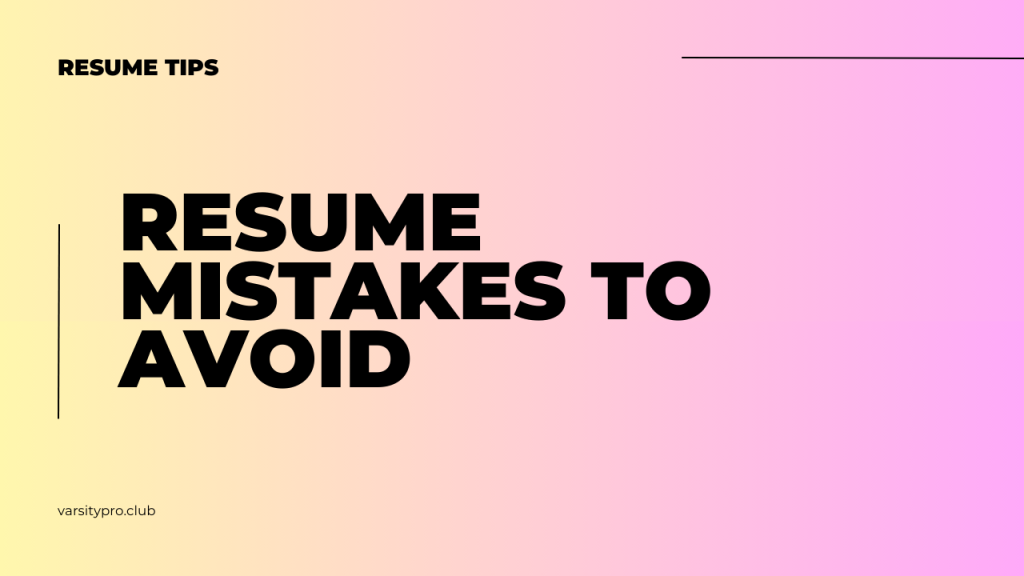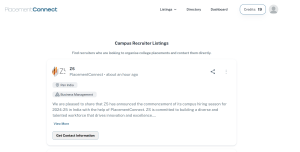Landing your first job feels like scaling Mount Everest – exciting, terrifying, and utterly dependent on having the right gear. For freshers, that gear is certainly the resume they present! Not surprisingly, how to prepare resume for freshers? remains a big-time question for them! This guide, tailored for freshers like you, will equip you with the knowledge and strategies to build the perfect resume!
Why is a Well-Crafted Resume Important for a Fresher?
Hiring managers receive countless applications for every position. A mediocre resume simply disappears into the abyss, lost in a sea of similar qualifications. But a resume that showcases your unique skills, aligns with the job description, and tells a compelling story will jump off the screen and demand attention. It’s your chance to stand out from the crowd and convince them that you’re the one they’ve been searching for
In today’s competitive job market, how to prepare resume for freshers is paramount for their success. It serves as a unique ticket to stand out among a sea of applicants. The resume functions as a marketing tool, strategically presenting the fresher’s skills and experiences in the best possible light. Here’s why a well-crafted resume is crucial for a fresher:
Making a Strong First Impression:
A well-crafted resume is the first point of contact between a fresher and a potential employer. It creates a positive initial impression by showcasing the individual’s capabilities and potential contributions. Employers often form their initial judgments based on the quality and relevance of the resume.
Highlighting Relevant Skills:
The resume acts as a platform to highlight the fresher’s skills, making it easier for recruiters to identify key competencies. It provides a structured overview of academic achievements, extracurricular activities, and any relevant projects or internships.
Demonstrating Fit within the Organization:
A strong resume not only lists qualifications but also reflects how the fresher could fit into the organizational culture. It enables recruiters to envision the candidate as a valuable asset, contributing positively to the workplace environment.
Increasing Visibility:
In a competitive job market, where recruiters often sift through numerous resumes, how to prepare resume for freshers that stands out? This is important as It directly increases the likelihood of the fresher’s profile being noticed, leading to potential interview opportunities.

What Are The Common Resume Mistakes Made by Freshers?
1. Grammatical Errors
Grammatical errors on a resume include misspellings, punctuation mistakes, or grammatical inconsistencies. An example could be, “I am seeking a challenging posision that can utilze my skillset.”
Grammatical errors create a negative impression, suggesting a lack of attention to detail and professionalism. Employers may question your communication skills and precision, crucial qualities in many job roles.
How to avoid this? To avoid grammatical errors, proofread your resume thoroughly. Utilize spelling and grammar check tools such as Grammarly and Quiltbot, and consider seeking feedback from peers or mentors. A second set of eyes can catch mistakes you might overlook. Taking the time to ensure grammatical accuracy reflects your commitment to presenting a polished and professional image.
2. Using a generic template and not customizing
Submitting a generic resume without tailoring it to match the specific job requirements is a common error. For example, using the same resume for different job applications without making any adjustments.
A one-size-fits-all approach shows a lack of effort and may not align with the employer’s needs. Employers appreciate candidates who take the time to customize their resumes, demonstrating a genuine interest in the position.
How to avoid this? To avoid this mistake, carefully review the job description and customize your resume for each application. Emphasize relevant skills and experiences based on the specific requirements of the job. Tailoring your resume not only increases your chances of getting noticed but also showcases your dedication to the role.
- Create different versions of your resume tailored to different job types and companies.
- Emphasize relevant skills and experiences for each position.
- Show them you understand their needs and how you can contribute to their success.
3. Ignoring Keywords
Ignoring keywords involves neglecting to include industry-specific terms that recruiters and automated systems often look for. An example would be failing to incorporate key terms mentioned in the job description.
This mistake can lead to your resume being overlooked by both human recruiters and applicant tracking systems (ATS). Many employers use keyword searches to filter through resumes quickly, and if your resume lacks these keywords, it may not make it past the initial screening.
How to avoid this? How to prepare resume for freshers that have the appropriate keywords included? Carefully review the job description, company website, and industry-related publications to identify relevant keywords. Incorporate these keywords naturally into your resume, ensuring that it aligns with the language used in the job posting.
- Analyze the job description and identify relevant keywords related to skills, experience, and qualifications.
- Incorporate these keywords organically throughout your resume, especially in your skills section and work experience descriptions.
- Avoid keyword stuffing – use them naturally and authentically.
- Rewrite your resume sections using relevant keywords without compromising on clarity or flow.
- Ensure your keywords align with your actual skills and experiences.
Read More About Keywords In Resume
4. Sending Outdated Resumes
Sending outdated resumes means submitting a resume that lacks your most recent experiences, skills, or qualifications. An example is not updating your resume after completing a recent course or gaining new skills.
Outdated information can make you seem less qualified and may not reflect your current capabilities. Employers want to see your most up-to-date achievements and skills to make informed decisions.
How to avoid this? Regularly update your resume, especially after acquiring new skills or completing relevant courses. Set a routine to review and refresh your resume every few months, ensuring that it accurately represents your current professional status.
5. Responsibilities vs Accomplishments- Quantify Your Results
Focusing on job duties rather than highlighting specific achievements and contributions is a common pitfall.
An example is listing duties without showcasing the impact or results of your work.
Employers want to see how you added value to your previous roles. Simply listing responsibilities doesn’t distinguish you from other candidates. By highlighting accomplishments, you provide concrete evidence of your contributions and potential.
How to avoid this? Shift your focus from mere job duties to achievements. Quantify your results where possible, demonstrating the tangible impact of your work. Examples:
- Replace “Answered customer inquiries” with “Resolved complex customer inquiries, achieving a 95% satisfaction rate.”
- Don’t just say “Processed orders,” say “Developed and implemented a streamlined order processing system, reducing errors by 15%.”
This not only captures the employer’s attention but also sets you apart as a candidate who goes above and beyond.
6. Too Lengthy- Irrelevant Details
Creating a resume that is excessively long, containing irrelevant or excessive details, is a common error. An example is a resume spanning multiple pages with unnecessary details about every job or project.
Employers typically spend a short time reviewing resumes, and a lengthy one may not receive the attention it deserves. Including irrelevant details can dilute the impact of your qualifications and may lead to key information being overlooked.
How to avoid this? How to prepare resume for freshers that has the perfect length? Keep your resume concise and focused on the most relevant and impactful information. Prioritize details that directly relate to the job you’re applying for, ensuring that each section adds value to your overall candidacy.
- Keep it concise and targeted. One or two pages are ideal for freshers.
- Prioritize relevant skills and experiences, focusing on those most applicable to the specific job.
- Cut out outdated or irrelevant information that doesn’t add value.
- Tailor your resume to each job application, highlighting specific skills and experiences relevant to the position.
- Use clear and concise language, avoiding unnecessary jargon or lengthy descriptions.
Remember: Brevity is a virtue. A concise resume makes a stronger impression and gets straight to the point.
7. Leaving Off Important Information
Omitting crucial details such as contact information, educational background, or relevant skills is a significant mistake. An example would be forgetting to include your current phone number or relevant certifications.
Incomplete information makes it difficult for employers to contact you or understand your qualifications. Employers need a comprehensive overview to make informed decisions about your suitability for the position.
How to avoid this? Double-check your resume to ensure it includes all vital details required by employers. This includes your updated contact information, academic credentials, and any certifications or licenses that enhance your qualifications.
- List relevant skills learned through academic projects, personal coding initiatives, or even online courses.
- Highlight accomplishments, even from volunteer work or extracurricular activities, that demonstrate transferable skills.
Also Read
8. Adding Unrelated Hobbies
Including hobbies on your resume that are unrelated to the job you’re applying for is a common error. An example is listing hobbies like stamp collecting for a marketing position.
Including irrelevant hobbies doesn’t contribute to your professional image and may distract from your qualifications. Employers are more interested in your professional skills and experiences rather than your personal pastimes.
How to avoid this? Only include hobbies that showcase skills or traits relevant to the job. If your hobby doesn’t add value or demonstrate applicable skills, it’s better to leave it off your resume.
- Choose hobbies that showcase transferable skills or personality traits relevant to the job.
- Highlight hobbies that demonstrate initiative, creativity, or problem-solving abilities.
- If your hobbies are truly unique, frame them in a way that connects them to the desired role.
What to do instead:
- Replace “Competitive yo-yoing” with “Organized and participated in yo-yoing competitions, developing strong organizational and leadership skills.”
- Instead of “Reality TV enthusiast,” consider “Passionate about storytelling and audience engagement, honed through analyzing popular TV shows.
9. Including Unprofessional Email Addresses
Using an email address that sounds unprofessional or inappropriate is a significant error.
An unprofessional email address gives the impression of a lack of professionalism and can be off-putting to employers. Your email address is part of your first impression, and it’s essential that it conveys a serious and business-oriented tone.
How to avoid this? Create a dedicated professional email address for job applications. Use a combination of your name and some numbers if necessary, keeping it simple and reflective of your professionalism.
- Create a professional email address specifically for job applications.
- Use a combination of your name and relevant keywords.
- Avoid nicknames, slang, or excessive numbers.
What to do instead:
- Invest in a professional email domain or use a reputable free service with a clean interface.
- Keep your email address concise and easy to remember.
Remember: Your email address is your digital handshake. Make it professional and memorable, reflecting your desire to make a positive impression.
10. Including Salary Requirements
Stating salary expectations on the resume instead of waiting for the negotiation stage is a common error. An example is stating, “I expect a starting salary of $X” on the resume.
Including salary expectations prematurely can potentially eliminate you from consideration based on salary alone. It’s advisable to discuss compensation during the negotiation phase of the hiring process.
How to avoid this? Leave salary discussions for later in the hiring process unless explicitly requested. Focus on showcasing your skills and qualifications on your resume, saving salary negotiations for later stages when both you and the employer have a better understanding of the fit.
Beyond Words: Optimizing Your Resume
A great resume is not just about the information, but also how it’s presented. A well-formatted and organized document improves readability and catches employers’ attention. Make your resume visually appealing before sending it out. It’s more than just a skills list.
This project showcases visual clarity, organization, professionalism, and attention to detail, which are highly valued qualities in the workplace. It highlights effective communication, logical information organization, and precise task navigation – all essential skills for any job.
Create a resume with relevant keywords spread throughout your experience and skills. Remember, keyword optimization is of utmost importance for your resume, as this saves it from getting stuck in the ATS test, without ever actually reaching the recruiters.
VarsityPro’s AI-based Resume Maker, lets you make sure all this with only a few clicks! Its AI auto-generates, formats, and optimizes your resume for ATS, while you simply need to feed in the information basic information about you!
The following sample resume, created by VarsityPro’s Resume Maker, demonstrates the basic format you can inculcate to make your resume even stronger:

How to Prepare Resume for Freshers Free of Mistakes In Your Resume?
Even after learning about resume mistakes and how to avoid them, it’s possible for errors to still occur. So, how to prepare resume for freshers that are free from errors? A resume can be extremely helpful in ensuring that your resume is free from any drawbacks. They provide specific and personalized feedback, allowing job seekers to correct those errors and improve their chances.

The resume scorer of VarsityPro provides you with clarity on how to prepare resume for freshers with the help of a resume scorer to test how strong your resume is, based on the following metrics:
Impact:
- Keyword Optimization: Its advanced AI technology thoroughly analyzes job descriptions, seamlessly integrating highly relevant keywords. This strategically enhances your resume’s visibility to the ATS by an impressive 70-80%, as proven by a comprehensive Jobscan study.
- Action Verbs: Replacing tentative language with strong verbs significantly enhances the perceived impact of your accomplishments by 25%, capturing the recruiter’s attention and highlighting your proactive demeanor.
- Quantifiable Metrics: Highlighting specific achievements with quantifiable metrics, such as “increased sales by 20%”, significantly enhances the effectiveness of your resume, increasing the likelihood of securing an interview by an impressive 30%, as reported by a survey conducted by Ladders.
Skills:
- Skills Spotlight: By efficiently identifying and eliminating any extraneous skills, it guarantees that your resume is laser-focused on the most pertinent skills for the job, thereby significantly boosting your perceived suitability by an impressive 20%, as confirmed by a study conducted by LinkedIn.
- Target-Based Optimization: Based on the job description, the scorer suggests adding impactful skills that weren’t mentioned before, making your resume even more competitive and targeted.
Brevity & Style:
- Personalized Insights: Its AI analyzes your writing style and suggests improvements to tone, vocabulary, and sentence structure, enhancing the professionalism and persuasiveness of your resume.
- Readability Radar: The scorer recommends formatting adjustments like bullet points and strong headers, making your resume visually appealing and easier to read, creating a positive first impression with recruiters.
So, ditch the anxiety and grab the VarsityPro scorer. Seeing your score increase with each edit is an empowering motivator. The scorer serves as your Confidence Booster, inspiring you to create a resume you can be genuinely proud of and confidently submit.
Find Jobs at varsitypro.club
Conclusion
How to prepare resume for freshers is an important question! The answer involves key principles. Customize your resume for each job application to highlight relevant skills and experiences. Pay attention to detail and avoid grammatical errors and typos. Use industry-specific keywords to navigate Applicant Tracking Systems (ATS). Update your resume regularly to reflect current skills and qualifications. Focus on accomplishments, not just responsibilities. Keep the document concise and professional. Use a suitable email address and avoid personal disclosures. Prioritize relevant work experiences and exclude unrelated hobbies. Address experience gaps by showcasing transferable skills and relevant projects. Follow these key takeaways for a powerful resume to kickstart your career journey.





